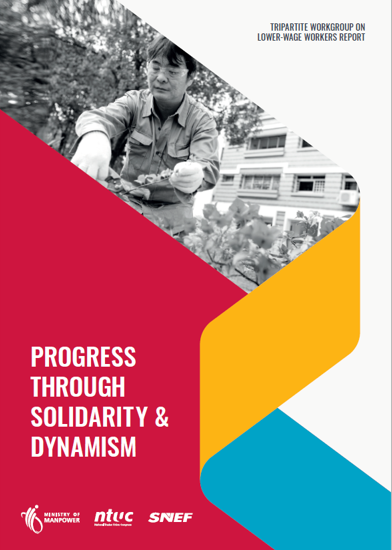As announced by the Ministry of Manpower (MOM) on Monday (30 Aug), the Government has accepted all recommendations by the Tripartite Workgroup on Lower-Wage Workers. The details of the recommendations came after Prime Minister Lee Hsien Loong announced the broad outlines at the National Day Rally on Sunday.
Among the new measures: The Government will extend the Progressive Wage Model (PWM) to more sectors in an accelerated timeline, and there will be new progressive wages for certain occupations that cut across sectors. The PWM will be extended to three new sectors – retail (from Sep 1, 2022), food services (from Mar 1, 2023) and waste management (from 2023).
18 recommendations from the Tripartite Workgroup on Lower-Wage Workers
1. Expand progressive wages to new sectors – retail from Sep 1, 2022, food services from Mar 1, 2023, and waste management from 2023.
2. Extend existing cleaning, security and landscape Progressive Wage Models to in-house workers from Sep 1, 2022.
3. Introduce new occupational progressive wages to administrators and drivers from Mar 1, 2023.
4. Firms employing foreign workers have to pay at least the Local Qualifying Salary to all local workers from Sep 1, 2022. This will be so even if the firm has excess foreign worker quota, or the sectoral or occupational progressive wages do not apply to the firm’s local workers.
5. Progressive wages and Local Qualifying Salary will be converted to fair hourly rates for those working part-time or overtime. This will provide firms flexibility to hire locals on different work arrangements without losing foreign worker access, while ensuring fair wages for workers based on their hours worked.
6. Baseline progressive wage growth for workers at the 20th percentile should outpace median wage growth, so that lower-wage workers gain ground with the median. Aim for higher than baseline growth for lower-paid lower-wage workers, and lower than baseline growth for workers in wage rungs above the 20th percentile wage level.
7. Maintain the overarching principle that wages should continue to keep pace with productivity growth, but provide scope for wage growth of lower-wage workers to outpace productivity. As lower-wage workers may be in roles with limited scope for productivity improvement, businesses should continue to enhance their firm-level productivity to better support wage increases for workers.
8. The National Wages Council should set annual guidance for progressive wage growth and recommend annual wage growth of occupational progressive wages.
9. Firms employing foreign workers have to pay at least the relevant sectoral or occupational progressive wages to all local workers in applicable job roles.
10. Leverage the Work Pass system to ensure that employers pay progressive wages and Local Qualifying Salary before they can access any foreign workers, while complemented by current licensing regimes.
11. In the long-term, express progressive wages in gross terms.
12. Government should review Workfare regularly to ensure that lower-wage workers continue to be supported even as progressive wages become more pervasive.
13. Government should provide transitional support for employers, with higher support in the initial phase as businesses recover from the impact of COVID-19.
14. Beyond wages, employers should advance the well-being of lower-wage workers by (i) supporting them to upskill and progress in their careers; (ii) providing them with a safe and healthy work environment; and (iii) providing them with adequate rest areas.
15. Establish a new Tripartite Standard on Advancing Lower-Wage Workers’ Well-Being, to help more firms adopt and implement the specified practices and be publicly recognised for doing so.
16. Establish a new Progressive Wage Mark to recognise firms that pay progressive wages. This will enable corporate buyers and individual consumers to purchase from these firms to support lower-wage workers’ wage increases. In addition, confer “PW Mark Plus” to firms that go the extra mile to uplift lower-wage workers holistically by advancing their well-being.
17. Public and private sector buyers should require their suppliers to obtain the Progressive Wage Mark.
18. Grow the Alliance for Action for Lower-Wage Workers, so that uplifting lower-wage workers is a whole-of-society endeavour.
Click here to read the full report on the recommendations by the Tripartite Workgroup on Lower Wage Workers.

